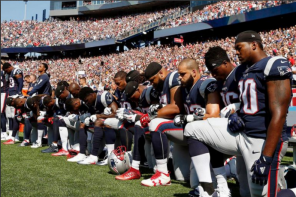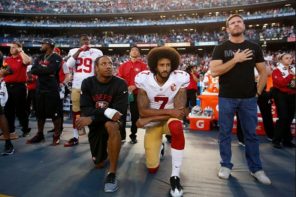Anyone following this year’s football season knows that the Atlanta Falcons are flying high: and so is their publicity machine. Their “Defend the Dome” campaign features a TV commercial reminiscent of a Batman movie; an online videogame in which fans “become John Abraham,” the ferocious and much-feared Falcons’ all-pro defensive lineman, “paralyzing their opponents with fear… bringing thousands of screaming fans to their feet… delivering that last-second game-winning sack”; and a Facebook page where fans express their devotion to the team, declaring that they “bleed Falcons red!” and urging their team to “eat some Dolphin… and Panther.”
If the Falcons’ victories in their first three home games are any indication, “Defend the Dome” is a success. As the Atlanta Journal-Constitution enthusiastically reported following the defeat of the Miami Dolphins, the Falcons “fought, harassed, stuffed, smothered, smacked” and ultimately “dismantled and dominated” their opponents before a sold-out Georgia Dome. Following this Sunday’s defeat of the Chicago Bears, the Falcons were described as “proudly professional… they can take a punch [and] they can deliver one too”.
Do You Cry for Blood at the Ringside?
What is it about football that evokes such primal stuff? People have been thinking about this for decades. In 1929 the American psychiatrist, A. A. Brill, writing for the North American Review asks,
Are you a fan? Does the summer afternoon find you shouting for the home team at the ballpark itself or in the crowd around the bulletin board and the loudspeaker? Does the World Series mean more to you than the fate of nations? [W]ill you frequently join the [football] stadium crowds and strain your vocal cords under the sway of a gymnastic cheerleader? Do you cry for blood at the ringside? In short, are you a fan?
“It is altogether to be hoped,” Brill continues, “for your psychic health and well-being, that you are.” Dr. Brill confidently prescribes the regular viewing of one’s favorite violent sport as a reliable means to individual well-being and social harmony. “No fight fan could be a criminal,” he tells us, “for in his favorite sport he finds the most thorough purgation of the more violent instincts.”
Religion scholar James McBride understands football fandom as a highly complex ritual in which male viewers collectively displace their identity onto players and teams that play out unconscious neuroses buried deep within the male psyche. Football games are won, McBride points out, by rendering one’s opponent “ball-less”—that is, by symbolically castrating them and rendering them “like women,” dominating them and penetrating their defenses, and driving the ball deep into their territory and ultimately “scoring.”
To change interpretive frames is to change universes: in one world there might be gods and demons, in another only atoms and empty space. In Brill’s interpretive universe, screaming fans “defend the dome” in a catharsis of violent tendencies. In McBride’s, they play out their unconscious resentment against a symbolic mother figure.
Of course, more measured accounts of fandom exist. In his recent work, for instance, Gary Laderman reminds us that sports offer potential for both our best and worst tendencies. On one hand, they represent the pursuit of perfection, a profound respect for rules, and “provide what twenty-first-century Americans seek most in this world: enjoyable diversions from daily routines, a model of order and coherence, and heroes to look up to and follow.” At the same time, however, they might be “bound up with hatred, jealously, and boastfulness, with a disregard for the rules, and a sadistic pleasure in witnessing violence.”
Football, Religion, and Power
Based upon my own experiences as a participant-observer at several professional football games over the past year, I would like to suggest yet another interpretive universe, albeit a bit more arcane. Garadus van der Leeuw was a Dutch philosopher who had a theory about religion: as he understood it, religion was about power. Not political power, but the power of something that is so different and unusual that it creates intense feelings of amazement in those who encounter it.
As evidence for his theory, van der Leeuw samples the history of religions for phenomena that might be linked to experiences of power, whether they be in nature (e.g., fire, water), sacred places (e.g., temples, trees, mountains), ritual practices and objects, or gods and spirits. Interestingly, he believes that human beings have tended to identify animals as sacred because they can do things we can’t: fly, run with terrific speed, or track. When we identify with an animal (a falcon, perhaps? Or a dolphin?) we are appropriating its power.
Whether or not we agree with van der Leeuw about the nature of religion, I think that his linking of the sacred with the subjective experience of mental, emotional, and physiological power provides a useful lens for interpreting contemporary football fandom. Anyone who has been to a professional football game can attest to the ritualized behaviors of fans, and the carefully controlled economy of mental, emotional, and physical energy. When the home team possesses the ball and is attempting to drive downfield and score, fans grow eerily and anxiously quiet, allowing the players on the home team’s offensive squad to communicate. If the home team executes a play effectively, or scores, the crowd explodes in celebration. When the opposing team possesses the ball, fans clap, scream, stomp, bang on seats and drums, wave hands and arms and banners, all as boisterously as possible to prevent effective communication among their players. As the home team succeeds on both offense and defense, the power generated and experienced by the crowd crescendos into waves of emotional energy.
The origins of fandom lie, in this view, not in the catharsis of violent instincts or in neurotic attempts to dominate a symbolic mother figure, but rather in the desire to connect with, appropriate, and experience as one’s own a significant source of power.
Fans flock to domes and stadiums, engage in collective rituals that govern the containment and forceful expression of their mental, emotional, and physiological, energies in ways that contribute to their team’s success and their enemies’ defeat, which in turn secures yet further cycles of power to be consumed. As evidence of this energy-economy operative within fandom, one need only observe attendees emerging from a game: victory produces highly energized celebrants; defeat yields low-energy souls consoling one another as they go.
Defend the dome, defend the power.




